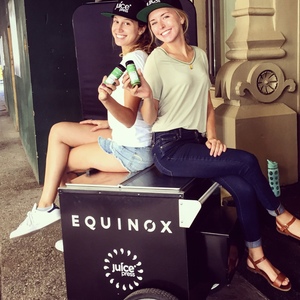It’s that time of year again. You’ve barely made it through midterm season and finals are slowly approaching. It’s completely normal to start feeling overly-stressed, anxious, or even depressed during this time. Thankfully there is a simple way to combat this. Cue the magical powers of probiotics…
Probi-what?
Okay, so you’ve probably heard a lot about probiotics, but what exactly are they? Probiotics are live microorganisms that provide health benefits when consumed. In other words, probiotics are “good” bacteria that are incorporated into our own intestinal bacteria when we consume them.
You may have also heard that Probiotics do a number of things such as improve digestion and boost immune function, but did you know that they actually play a large role in our mental health? Recent research has shown that Probiotics are a key player in the connection between our digestive and nervous systems, otherwise known as the gut-brain connection.
The Gut-Brain Connection

Did you know that your brain is actually connected to your intestines? While they are not literally connected, the gut-brain axis joins the two through a signaling pathway. This connection causes our gut microbiota, or ratio of “good” bacteria to “bad” bacteria, to have a large influence over our mental health.
This phenomena occurs through the action of our “good” bacteria when we consume food. As food passes through our intestines, it is further digested by our “good” bacteria. This digestion releases certain chemicals which actually signal the brain to release neurotransmitters, or chemical signals from the brain that travel to the rest of the body.
These neurotransmitters include serotonin, dopamine, and GABA, all of which play a role in depression and anxiety. In summary, the composition of our gut microbiota (“good” vs. “bad” bacteria) alters our brain chemistry in a way that affects our mood.
Recent studies have been published linking the intake of Probiotics to decreased incidence of stress, depression, and anxiety. It has been shown that strains of bacteria found in Probiotics reduced stress hormones and anxiety-like behavior in mice. Studies in humans have shown that daily consumption of probiotic-containing yogurt had an effect on the brain regions responsible for emotion and sensation.
This research may be powerful enough to change the way we start treating depression, anxiety, and other stress-related disorders. Who knows, maybe in a few years probiotics will become the new Prozac.
Now that you have all of this information about the benefits of Probiotics, its time to start incorporating them into your diet. There are two ways you can do this.
1. Eat Foods with Probiotics
Ever since I started taking probiotics my microbiome is so culturally enriched
Fermented milk products: kefir, cheese, sour cream
Non-Dairy Fermented foods: sauerkraut, kimchi, pickles, tempeh, miso, kombucha
Supplements: capsule, powder, tablet
2. Eat Foods with Prebiotics

Prebiotics are non-digestible foods that promote the growth of “good” bacteria in the intestine. Basically, prebiotics are a source of food for probiotics. The key to a great prebiotic is it’s non-digestible fiber content. Here are some fiber-rich sources of prebiotics:
Grains: whole wheat flour, oatmeal, flax, barley
Vegetables: garlic, onions, greens, asparagus, legumes
Fruits: berries, bananas
Hungry for More?
Here are some great recipes that combine prebiotics and Probiotics to give you the biggest bang for your buck.

Chocolate Cheesecake Overnight Oats


Kimchi Mac n’ Cheese (use whole wheat pasta)



